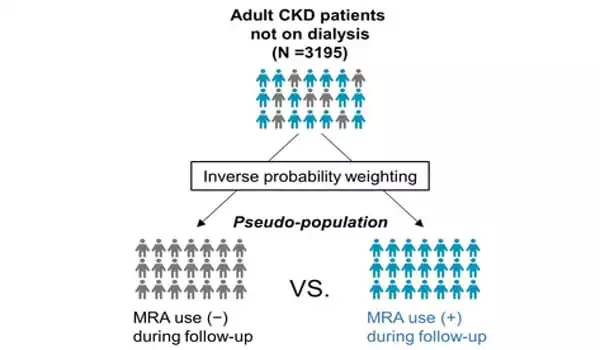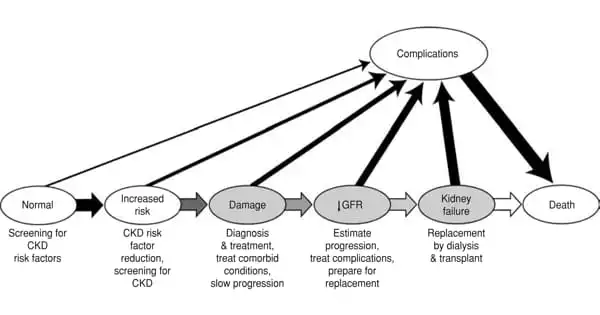Chronic kidney disease (CKD), which is linked to an elevated risk of morbidity and mortality, is becoming more prevalent. Once CKD has occurred, the glomerular filtration rate (GFR) decreases at an inexorable, albeit extremely varied, rate. Furthermore, patients with rapidly declining GFR are at an increased risk of unfavorable cardiovascular disease outcomes.
A retrospective analysis of nearly 3100 persons with chronic kidney disease was done to assess the relationship between mineralocorticoid receptor antagonist (MRA) use and renal outcomes. The study found a link between MRA use and a lower chance of starting renal replacement therapy in multiple subgroups of individuals with chronic kidney disease. These findings support the use of MRAs in treatment strategies for different groups of persons with chronic renal disease who do not require dialysis.
Controlling your blood pressure is the most critical action you can do to address renal disease. Your kidneys might be harmed by high blood pressure. You can preserve your kidneys by keeping your blood pressure at or below the level recommended by your doctor. Blood pressure should be less than 140/90 mm Hg for the majority of people.
We conducted a retrospective analysis of clinical data from over 3100 individuals with CKD. We evaluated MRA treatment in various populations of people with CKD, including those with diabetes, heart disease, and severely impaired renal function.
Tatsufumi Oka
In the same way that a water filtration system filters toxins from the water you consume, your kidneys filter waste and excess fluid from your blood. Chronic kidney disease (CKD) causes kidney function to deteriorate over time, resulting in an accumulation of extra fluid and waste that has a negative impact on overall body function. Researchers in Japan examined real-world data from CKD patients to assess the impact of a regularly prescribed medicine on disease outcome.
Researchers from Osaka University found a link between the usage of mineralocorticoid receptor antagonists (MRAs), a type of drug that works by blocking the action of the steroid hormone aldosterone, and a better renal prognosis in people with CKD in a study published in Hypertension.
As the disease advances, renal replacement treatment (RRT), which includes dialysis and kidney transplantation, may be required for life support in kidney failure. MRAs, which include spironolactone, eplerenone, and potassium canrenoate, are routinely used to treat CKD by lowering edema, blood pressure, and urine protein levels. However, the relationship between MRA treatment and the beginning of RRT has not been thoroughly investigated in a real-world population, prompting the Osaka University research team to conduct a large-scale retrospective analysis of MRA use in persons with CKD.

“We conducted a retrospective analysis of clinical data from over 3100 individuals with CKD,” says lead author Tatsufumi Oka. “We evaluated MRA treatment in various populations of people with CKD, including those with diabetes, heart disease, and severely impaired renal function.”
The researchers used a marginal structural model to examine the relationship between MRA use and RRT initiation across multiple patient subgroups. “Our study revealed that using an MRA was related with a 28% lower probability of RRT beginning and a 24% lower rate of the combined outcomes of RRT initiation and mortality,” explains senior author Jun-Ya Kaimori.
The study found a lower probability of RRT initiation in various subgroups of persons with CKD, including those with and without diabetes, as well as those with significantly impaired renal function. These data illustrate the link between MRA use and better renal outcomes in a real-world sample of CKD patients with different health histories. Overall, this study supports the use of MRAs in treatment strategies for various categories of CKD patients who do not require dialysis.
Check your blood glucose level on a frequent basis to ensure that you are on track to meet your blood glucose goal. Use the findings to make decisions about food, exercise, and medications. Inquire with your doctor about how frequently you should monitor your blood glucose level. The tests used by doctors to diagnose kidney illness can also be used to track changes in kidney function and damage. Kidney disease deteriorates over time. Ask your provider how the latest test findings compare to the previous ones every time you get checked.
















